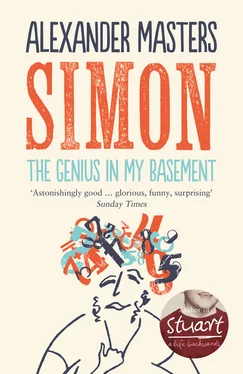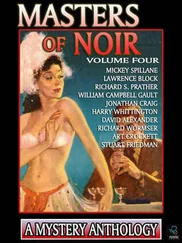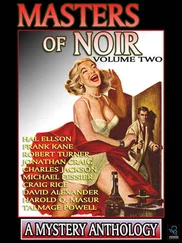For Simon, the world is a leaky place. You have constantly to be on your guard against the seeping away or sudden disappearance of comfort. He imagines that this book (‘if it ever comes out’) will be ‘bedside reading’ for housing inspectors. He thinks they might run him out of the city.
If that’s what words can do when wrongly applied to a few cubic feet of basement air enclosed by bricks and bramble-bush-covered windows, what massacre will they perform on the central object of a full-length biography – which is a trillion misunderstandings-in-waiting – i.e. a living human being?
Simon says he doesn’t stomp. I say he does. Simon says he should know, since a) he does the non-stomping and b) he’s closer to his feet than I am.
‘But if you are stomping on the ceiling, then my ears are closer,’ I observe. ‘Biography – especially biography of an unknown person – is not and cannot be about reality.’ I follow after him to the kitchen. ‘It’s no more about reality than, say, say … minus numbers. And just as the solution to the problem of the impossible existence of minus numbers is to realise that they are not real things at all, but something you’ve done to positive numbers, i.e. you’ve “minus-ed” them – in short, minus numbers are verbs, not nouns – so in biography, it’s not the real subject, but the active, i.e. verbal, relationship between the biographer and subject that …’
‘Mathematicians do not think of negative numbers like that,’ interrupts Simon, tugging at the mackerel tin, which has somehow got wedged in his pocket. ‘We think of them as real objects. Exactly as real as positive numbers.’
‘The reason that a biography of an unknown person cannot be about reality,’ I continue regardless, ‘is because the reader will fall asleep. Reality is too bland. An ordinary person doesn’t have the dramatic and universally appreciated facts of the famous to rely on. They’ve only got the oddness and power of their character. So,’ I say, expanding my chest with the sudden conviction that I am going to be able to complete these sentences neatly, ‘a biography of the unknown has to be a biographer’s effort to interpret facts, his impression of the facts – what has been done to the facts by his brain. It’s about one person’s mumbled attempts vaguely to interpret what they dimly think they might have seen on a misty day in another person’s possible behaviour, but which they quite possibly haven’t; and any biographer who puts pen to paper claiming his motives are objectivity and truth is a fraud. Biography is not mathematics. It is not bus timetables. What matters is not whether or not you “stomp”, in fact, since who can know that as a fact, but that I think you stomp, and by the way, aren’t you supposed to take the sweetcorn out of the supermarket bag before you put the tin in boiling water?’
Squeak of a tap; the cymbal clatter of high-pressure liquid on thin cooking steel; the castanets and maracas of bubbles; muffled turbulence as the pot fills.
Simon’s wolfish. While we were trespassing through the rubbish in this basement, he’d been on a moonlit hike around the city distributing anti-car newsletters for an environmental campaign group called Transport 2000, and it’s emptied his belly. After buses and trains, the thing that matters most to him is his digestive tract.
Small headless fish are his favourite food. Except when in Montreal, Simon boils his kippers in the tin, ‘to save on washing up’. Kippers come in a different-sized tin in Canada, and ‘I don’t want to take the chance of doing something wrong.’ In Montreal he eats frozen fish in supermarket display packs – not because he prefers it, but because the label tells him what to do, which is comforting, although he never grills, ‘because you can’t see what’s going on’.
Like Ludwig Wittgenstein, Simon does not enjoy variety in food.
‘I like to find a formula that works and stick to it,’ he insists, stepping out of the kitchen to make sure I understand. ‘I once found myself in possession of mackerel in curry sauce because I’d failed to look carefully enough when in the supermarket. I couldn’t finish it.
‘Yes, I am a worrier. My mother was a worrier.’
Simon is incapable of frowning; his expressions are limited to petulance, grinning and vacuity. He adopts the last, and returns to the stove.
Mackerel Norton, the dish he is preparing this evening, is his Number One meal. It comes in two forms: finger-scalding hot; and body temperature. Tonight, he’s having it hot.
Mackerel Norton for one
1 x tin of mackerel fillets, any sort, as long as not in tomato sauce .
1 x flavoured Batchelor’s Chinese packet rice. (‘I sometimes use “Golden Vegetable”.’)
2 x pans of boiling water.
Put first two in the third. Bubble rice frothily for correct time. Release rice, spurt open mackerel, eat on bed with much handwaving and gulps of cool air.
He would, if he could, eat Mackerel Norton seven days a week; but world events and the pressures of anti-car campaigning are such that he can barely manage to get it three days in a row. The rest of the time he gobbles two forms of takeaway (chicken biriyani and chicken in black bean sauce), chilli-flavour crisps from Morrisons and Bombay mix.
This evening Simon has accidentally picked up a different-flavour packet rice, and is alarmed. Cooking instructions are suspect to Simon. They are the route errors use when they want to sneak into your stomach. Why should one flavour respond to hot water in the same way as another? How can you be sure that one rice packet, representing the products of a country containing yellow people in blue boilersuits, should be treated the same as another packet, from a country 16,000 miles distant from the first, with brown people and cactuses? Cooking instructions have no appreciation of the slyness of variables.
‘Uugggh, do Mexican vegetables boil in the same way as Chinese?’ Simon asks, waving the packet at me through the kitchen door.
In Simon’s kitchen there are no cobwebs. An aerosol of grease has killed them off. If you stand on a footstool, it is possible to find – original inhabitants, from before the Extinction Event (Simon’s purchase of the house in 1981) – dead spiders inhumed above the wall cupboards, in the Cretaceous layers of fat.
There is evidence of urgent eating everywhere. The oil slicks on the melamine surfaces; eyebrow hairs embedded around the sink; foot and shoe grime that has gathered on the plastic embossed-tile flooring, making it look almost as though there is a rug on top; the curtains of grease moving down the sides of the sink like textured glass.
Simon is not unhealthy. The principal source of serious infection in any house – the water supply – is cleaner here than in most places, because the attic in which the water head is stored is used as a room for tenants, and is therefore easily accessible and frequently checked. I can vouch for the fact that there are no mice floating in it, or spiders, woodlice, bloated and putrefying snails, or dead rats, as there certainly will be in the water tanks belonging to some of the people reading this sentence.
He is not unhygienic, except in the eyes of today’s dainty obsessives and kitchen-product advertisers. He has a bath once a week and cleans his teeth daily. But he is not frightened of his digestion. Simon’s connection with decomposing food begins and ends, openly and honestly, as it does with all animals at ease: with a squelchy chew at one end and a sigh of release at the other.
In a tidy kitchen, every knife, plate, whisk, frying pan, coffee mug, ladle, tea strainer, chopping board and all machines are stagnant with cleanliness, with the exception of the dishwasher murmuring disinfectant-speak under the sink. The object of the tidy and twee housekeeper is to remove all proof that he is a functioning organism.
Читать дальше












